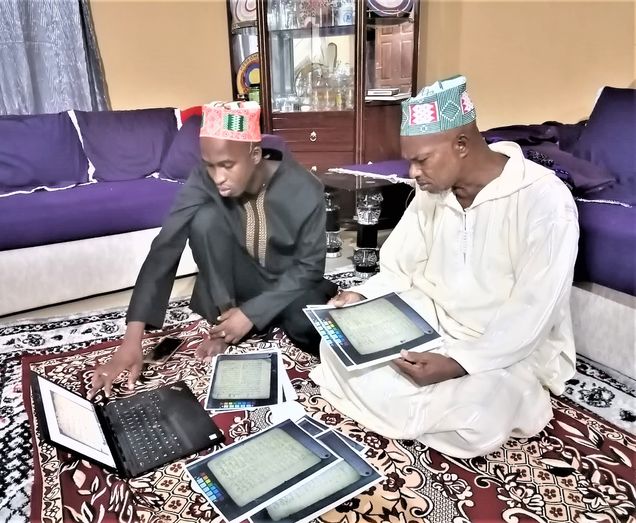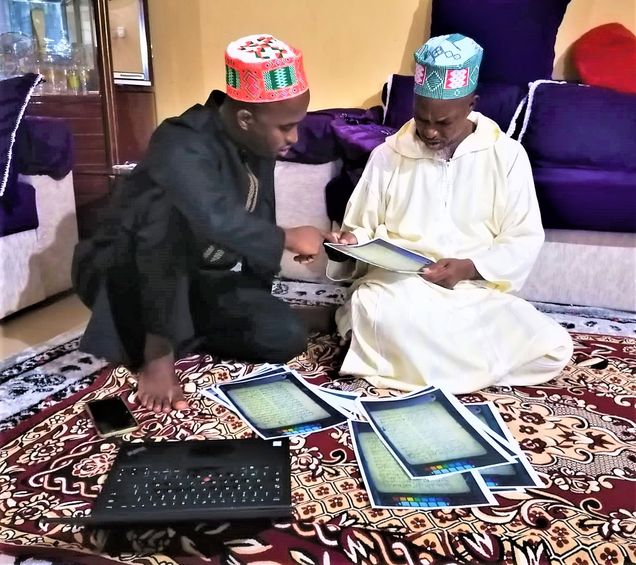Reflecting on my Experience of Working with Fula Ajami Manuscripts
By Boubacar Biro Diallo
August 20, 2022
I was exposed to Fula Ajami since my childhood in the early 90s in Ziguinchor, south of Senegal. My father—a Fula community leader—uses Ajami to send and receive letters to and from his parents and relatives in Guinea. He has also a collection of Ajami poems and other manuscripts that he has received from the previous generation.
Through my mother, a Pular teacher, I learned to read and write in Pular. This family background helped me a lot in my current work as Fula Language Team Consultant with the BU NEH Ajami Project since January 2021. I turned primarily to my parents to overcome certain challenges in my current work.
The transcription is less complex
Transcription is based on the ability to read and understand the Ajami text and transcribe it in Fula using appropriate characters. However, the challenges are related to the readability of the text, as certain documents are very old and somewhat damaged. For instance, with «Lette Habbiiɗe Mo Juulata Ñande Laakara» [Punishment for Those Who Do Not Pray on the Judgment Day], there is a black ink hiding some parts of the text. To overcome this challenge, I had to read the text several times, and consult with my dad who also double-checked with other Fulani cantors (jarooɓe). A good transcription is very important since it helps us to better understand the text for a better translation.
The translation is more challenging 
Fula Ajami texts are not just written in the Fula language. They also feature linguistic borrowing, resulting from the influence of other cultures. For instance, while in Fula, the word for young man is suka or sagataa, some texts used kambaano, which is a word borrowed from Mandinka, a language spoken in the same geographic area in West Africa along with Fula. Therefore, for a better translation, it is important to have basic knowledge of other languages mainly spoken in the same area.
In addition, the Fula Ajami texts predominantly feature Islamic references and teachings. This is due to the fact that the Fula people are considered among the first African communities to convert to Islam, and they have played an important role in promoting Islam in West Africa in particular. As a result, many Ajami texts use a mix of Fula and Arabic words, and regularly quote the sayings of God from the Quran and His prophet Muhammad (PBUH). Every time I encountered an Ajami text that mentions “Alla daali” [Allah majestically said] or “Nulaaɗo maaki” [The Prophet respectfully said), I tried to find their references in the Quran or the hadiths (records of the sayings and teachings of Prophet Muhammad-PBUH), as Ajami texts often do not provide the exact refere nce to such sayings. I followed the same process also to better understand certain Islamic concepts and events referred to in the Ajami text.
nce to such sayings. I followed the same process also to better understand certain Islamic concepts and events referred to in the Ajami text.
Therefore, a better translation of Fula Ajami requires advanced knowledge of Islam and the ability to conduct further research to clarify certain concepts mentioned in the Ajami texts, with providing a comprehensive footnote explanation.
Suggestions
The BU NEH Ajami Project is revolutionary as it contradicts the prevailing belief that only oral traditions existed in sub-Saharan Africa prior to European colonization. In this respect, the scientific work of Pr. Fallou Ngom and his leadership with the NEH Ajami project are transformative.
To better maximize the impact of the Project, it is important to promote cooperation with African universities and research institutes, train them in Ajami and support their work. This would help integrating Ajami as an important component of the African literature and a major source of knowledge that needs to be understood, taught, and promoted among the academic and research community. For instance, many African elites, including prominent scholars, are unable to read in Ajami, therefore ignoring this important source of knowledge in their research.
Ajami is also frequently ignored by the current young generation that is only trained through Western-based formal education. This is the result of the government education system and public policies that consider as “alphabets” [literate] only those who can write, read, and speak Western languages (the languages of the former colonizers).
Following the BU NEH Ajami Project workshop in July 2022, I conducted an informal survey of 100 Fula young people, including 37 women to assess their knowledge of Ajami writers, particularly Cerno Samba Mombeya who is one of the most famous authors writing in Ajami. 41 percent responded that they knew him, including 8 women, while only 11 percent (3 women) were able to name other Ajami writers. Therefore, outreach with African governments inter-governmental organizations, and policymakers is important to promote continued Ajami use on the continent.
Lastly, it would be useful to associate those involved in the transcription and translation of the Ajami documents (the consultants) in collecting Ajami texts. This would allow the consultants to go through the texts, assess their value for the BU NEH Ajami Project, pose questions to the Ajami text owners, and maintain continued contact with them through the transcription and translation process, in case of any further clarification needed. This is why it would be more useful to collect Ajami texts from those who know and are familiar with the content of the texts themselves, to facilitate a better utilization of the texts by the consultants.
Conclusion
My participation in the BU NEH Ajami Project has been a good opportunity to improve my knowledge of Ajami, and of my own culture and religion, and further appreciate the beauty of the Fula literature. This participation is positively appreciated by my parents, my relatives, and my community, particularly the elder generation, as they see this work as an important contribution to preserve the rich Fulani heritage. I also continue to reach out to my peers—the young people—to sensitize them about the importance of getting familiarized with Ajami and promoting it, as part of our culture and our contribution to the world.
I look forward to continuing my journey with the BU NEH Ajami Project and further improve my skills in this area in the service of our common humanity. I am grateful for the support that I have been receiving from the BU NEH Ajami Project’s team.
Boubacar Biro Diallo, a native speaker of Pular (Fuuta Jalon Fula), has been exposed to Ajami manuscripts at an early age through his father who received these documents from the previous generation. In addition to his formal education, Boubacar received trainings in Quran and Muslim jurisprudence (“fiqh”). Following his Bachelor’s degree in Sociology and Master’s degree in project in Management, Boubacar pursued a career in sustainable development, international cooperation and humanitarian affairs, working with several organizations including CorpsAfrica, the World Food Programme and the International Organization of La Francophonie. He is currently an independent consultant in youth development and project management, and teaches Pular courses at the Dakar Language Center. He is also fluent in French, Wolof and Mandinka.